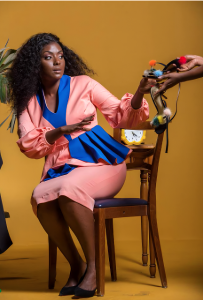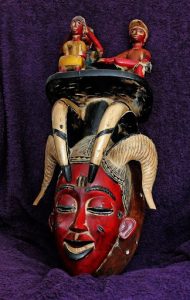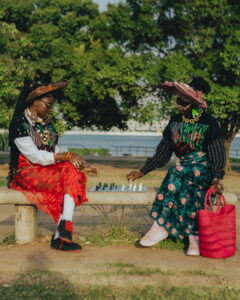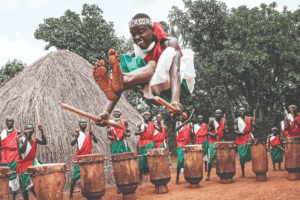
African Must-See Movies: Stories You Shouldn’t Miss
What if the best way to understand Africa was through movies? African cinema tells stories of struggle, survival, love, politics, and dreams. These films carry the rhythm of African life, the voice of its people, and the questions we still wrestle with today.
Here are 11 movies that capture the heart of the African continent, each with a story worth knowing.
Night of the Kings
Inside a prison in Abidjan, a young man is forced to tell stories through the night to keep himself alive. As he speaks, the prisoners around him act out his words in song, dance, and ritual. Directed by Philippe Lacôte, this is more than a prison drama; it’s about the power of storytelling in African culture, where words themselves can be survival.
4.4.44

At its core, this is a story about fate and how choices from the past refuse to stay buried. Secrets return, and the present is forced to reckon with them. Directed by Izu Ojukwu, the film mixes suspense with deeply Nigerian textures, showing how African cinema often blends mystery with culture and morality.
Saloum

Three mercenaries – the Bangui Hyenas, escape a coup in Guinea-Bissau and crash-land in the eerie stillness of Senegal’s Saloum Delta. At first, it feels like a slick action adventure. But as night falls, something older, darker, and supernatural awakens. Director Jean Luc Herbulot reinvents African genre cinema, fusing Western tropes, mystical folklore, and horror into one. Saloum is as much about violence and revenge as it is about confronting ancestral spirits, and the price of secrets buried too deep.
Bàttu

In Dakar, beggars are removed from the streets in the name of “progress.” But instead of disappearing, they rise to resist. Directed by Cheick Oumar Sissoko, Bàttu is based on Aminata Sow Fall’s novel and questions how a society treats its most vulnerable. It’s a story of human resilience, a moral drama that critiques the cruelty of exclusion and questions whether development can ever be just if it leaves the vulnerable behind.
Queen of Katwe

Phiona Mutesi, a young girl selling maize in Kampala’s Katwe slum, stumbles upon a game of chess. What begins as curiosity transforms into destiny, as she rises to become a national chess champion. Directed by Mira Nair, the film is both tender and triumphant, balancing the grit of everyday life with the glow of possibility. Lupita Nyong’o’s performance as Phiona’s mother is magnetic, grounding the film in the fierce, everyday strength of African womanhood. This is not just a sports drama, it’s an ode to hope born in unlikely places.
Mother of George

Adenike and Ayodele are newly married, but as the months pass without a child, family pressure mounts. Adenike faces a painful choice: preserve tradition or preserve her marriage. The film is visually stunning, filled with color and texture, while exploring how tradition, family, and personal choice collide. It is a story of love under pressure, directed by Andrew Dosunmu, it is one that resonates across cultures but is deeply rooted in Nigerian life.
The Athlete

Before the world knew his name, Abebe Bikila ran barefoot to Olympic gold in Rome, becoming not just a champion but a symbol of African pride on the global stage. The Athlete, co-directed by Rasselas Lakew and Davey Frankel, captures both his triumphs and his tragedy, including the car accident that left him paralyzed. Yet even in despair, Bikila’s dignity shines.
How to Steal 2 Million

Fresh out of prison, Jack is drawn into one last heist with his old crew. But betrayal simmers, loyalties fracture, and survival becomes the only currency. Beneath the heist narrative lies a story about friendship, greed, and the heavy weight of choices made in desperation.
God is African

When a Nigerian student in Johannesburg gets caught up in student activism, he is forced to confront not only South Africa’s turbulent politics but also the question of pan-African solidarity. Akin Omotoso mixes humor, sharp commentary, and a youthful energy that reflects the restless urgency of a new generation. It’s a film that speaks to the continent’s diversity and shared struggles.
Bamako

In a courtyard in Bamako, ordinary life carries on, but at the same time, the World Bank and IMF are put on trial for Africa’s economic troubles. Bamako is part courtroom drama, part political essay, and part everyday realism. It forces viewers to confront the global forces that shape African lives, without ever losing sight of the small, intimate details of ordinary existence..
A Country Called Ghana

Directed by Kwaw Ansah, one of West Africa’s most celebrated filmmakers, this film looks at Ghana through the lens of history, corruption, and identity. It is a love letter to the nation but also a sharp critique of its struggles. Ansah uses film not just to tell a story but to question what it means to be a citizen of a country still defining its place in the world.








Don’t miss a thing! Sign up to get new content sent directly to your inbox.